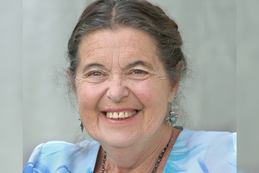 |
|
| Lynne Reid Banks | |
Lynne Reid Banks, a "versatile British author who began her writing career with the bestselling feminist novel The L-Shaped Room but found her biggest success with the popular children's book The Indian in the Cupboard," died April 4, the New York Times reported. She was 94. Banks was "part of a generation of writers that emerged in postwar Britain and whose books explored the struggles of young women seeking personal and financial independence."
In The L-Shaped Room (1960), class, race, sexism, and the danger of illegal abortions are all central to the plot, though Banks did not consider herself a feminist when she wrote the book. She soon changed her mind, however. "What a joke," she told the BBC program Bookclub in 2010. "I mean, I don't believe that anymore. I think women are infinitely the superior sex and that men are probably the most dangerous creatures on the planet."
She did regret the racial tropes used in her portrayal of the Caribbean housemate in The L-Shaped Room, acknowledging that the "prejudices existed, and they came out in this book, and it's shame-making, but there they were," she told the BBC. "They were absolutely part of the atmosphere." The bestselling novel was made into a film starring Leslie Caron, who won an Oscar nomination for best actress.
Banks wrote two sequels--The Backward Shadow (1970) and Two Is Lonely (1974)--as well as two books on the Brontë sisters: Dark Quartet: The Story of the Brontës (1976) and Path to the Silent Country: Charlotte Brontë's Years of Fame (1977).
She began writing books for children and young adults in the 1970s, and wrote more than 45 books for adults and children altogether, as well as 13 plays produced for radio and theater.
The Indian in the Cupboard (1980) was the first in a five-book series. The Times wrote: "Although the purported message to young readers was the importance of tolerance and respect for other cultures, Ms. Banks was later accused of perpetuating stereotypes. (Little Bear speaks in a dialect of broken English, and the cowboy is a laconic man who likes his whiskey.)."
The American Indian Library Association in 1991 listed The Indian in the Cupboard series among the "titles to avoid," and a school board in British Columbia temporarily removed the first book from its libraries in 1992, citing "offensive treatment of native peoples." The series remained popular, however, and The Indian in the Cupboard was adapted into a 1995 film directed by Frank Oz.
The challenge of single motherhood was a theme Banks returned to in 2014 in Uprooted: A Canadian War Story, a YA novel based on the years that she and her mother spent in Canada during the war.
Nick Lake, fiction publisher at HarperCollins Children's Books and Harper Fires, told the Bookseller: "Lynne Reid Banks is one of the greatest and most influential children's authors, and we are so proud to be the publishers of many of her books, including The Indian in the Cupboard, which has long been one of the most beloved titles on our modern classics list--delighting and inspiring generations of children."
James Wills, Banks's agent, commented: "Lynne was a remarkable woman, a terrific writer and a born storyteller. She was a formidable creative force well into her nineties and she told me, indefatigable as ever, how much she was looking forward to the paperback publication of The Red Red Dragon (Walker Books) this summer, which comes out the day after what would have been her 95th birthday, as she was as determined as ever to get out and promote the book and meet her many readers. She never lost her unwavering passion for books and her rich legacy of work has touched millions of readers around the world; she'll be sorely missed."

